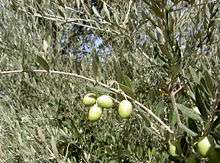olive
See also: Olive
English

a typical olive tree (Olea europaea) (1)
Etymology
From Middle English olyve, borrowed from Old French olive (“olive, olive tree”), from Latin olīva (“olive”), from Etruscan 𐌄𐌋𐌄𐌉𐌅𐌀 (eleiva) or Proto-Greek *ἐλαίϝα (*elaíwa), ultimately from Proto-Indo-European *loiwom (compare Old Church Slavonic лои (loi, “tallow”), Old Armenian եւղ (ewł, “oil”)).[1]
Pronunciation
- enPR: ŏl'ĭv, IPA(key): /ˈɒlɪv/
Audio (UK) (file) - enPR: äl'ĭv, IPA(key): /ˈɑlɪv/
Audio (US) (file)
Noun
olive (plural olives)
- An tree, Olea europaea, cultivated since ancient times in the Mediterranean for its fruit and the oil obtained from it.
- The small oval fruit of this tree, eaten ripe (usually black) or unripe (usually green).
- The wood of the olive tree.
- A dark yellowish-green color, that of an unripe olive.
- olive colour:
- (anatomy) An olivary body, part of the medulla oblongata.
- A component of a plumbing compression joint; a ring which is placed between the nut and the pipe and compressed during fastening to provide a seal.
- (cooking) A small slice of meat seasoned, rolled up, and cooked.
- a beef olive
- olives of veal
- Any shell of the genus Oliva and allied genera; so called from the shape.
- (Britain, dialectal) An oystercatcher, a shore bird.
Derived terms
- black olive
- green olive
- olive baboon (Papio anubis)
- olive barb (Systomus sarana)
- olive bee-eater (Merops superciliosus)
- olive branch
- olive bulbul (Iole viridescens)
- olive coleus (Solenostemon scutellariodes)
- olive colobus (Procolobus verus)
- olive crown
- olive drab
- olive finch (Arremon castaneiceps)
- olive flounder (Paralichthys olivaceus)
- olive flyrobin (Microeca flavovirescens)
- olive fruit fly (Dacus oleae)
- olive green
- olive grove
- olive honeyeater (Lichmera argentauris)
- olive ibis (Bostrychia olivacea)
- olive knot (Pseudomonas savastonoi)
- olive lace bug (Froggattia olivina)
- olive long-tailed cuckoo (Cercococcyx olivinus)
- olive mangrove
- olive marsh snake (Natriciteres olivacea)
- olive moth (Prays oleellus)
- olive oil
- olive oropendola (Psarocolius bifasciatus)
- olive plum (Elaeodendron
- olive python (Liasis olivaceus)
- olive ridley sea turtle (Lepidochelys olivacea)
- olive scab
- olive scale
- olive sea snake (Aipysurus laevis)
- olive shell (Olividae spp.)
- olive snail (Olividae spp.)
- olive sparrow (Arremonops rufivirgatus spp.)
- olive spinetail (Cranioleuca obsoleta)
- olive sunbird (Cyanomitra olivacea)
- olive thrush (Turdus olivaceus)
- olive tree
- olive tubercle (Pseudomonas savastonoi)
- olive warbler (Peucedramus taeniatus)
- olive whistler (Pachycephala olivacea)
- olive woodpecker (Dendropicos griseocephalus)
- olivey
- queen olive
- Russian olive (Elaeagnus angustifolia)
- wild olive
Translations
olive tree — see olive tree
fruit
|
|
wood
colour
|
|
- The translations below need to be checked and inserted above into the appropriate translation tables, removing any numbers. Numbers do not necessarily match those in definitions. See instructions at Wiktionary:Entry layout#Translations.
Translations to be checked
|
Adjective
olive (comparative more olive, superlative most olive)
- Of a grayish green color, that of an unripe olive.
- 1907, Harold Edward Bindloss, chapter 22, in The Dust of Conflict:
- Appleby […] rose from his seat when Morales came in. He shook hands urbanely, unbuckled his sword, and laid his kepi on the table, and then sat down with an expression of concern in his olive face which Appleby fancied was assumed.
-
Translations
colour
|
|
See also
- à la grecque
- Castile soap
- Gethsemane
- Wiktionary appendix of colours
References
- Radoslav Katičić, Ancient Languages of the Balkans, Part One (Paris: Mouton, 1976).
French
Etymology
From Old French olive, from Latin olīva.
Pronunciation
- IPA(key): /ɔ.liv/
Audio (FR) (file) Audio (file)
Derived terms
Further reading
- “olive” in le Trésor de la langue française informatisé (The Digitized Treasury of the French Language).
Middle English
Old French
Slovak
Pronunciation
- IPA(key): /ˈɔlivɛ/
This article is issued from
Wiktionary.
The text is licensed under Creative
Commons - Attribution - Sharealike.
Additional terms may apply for the media files.